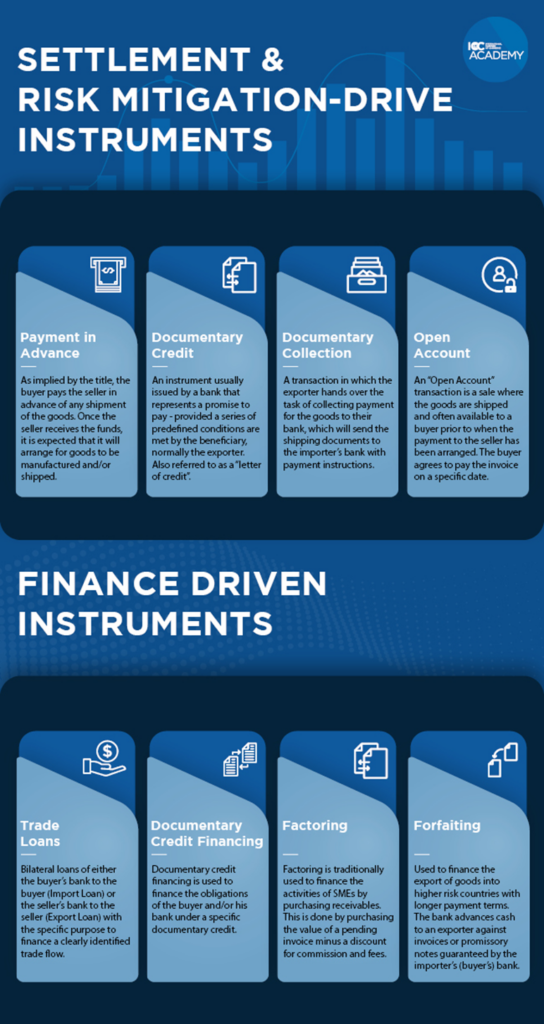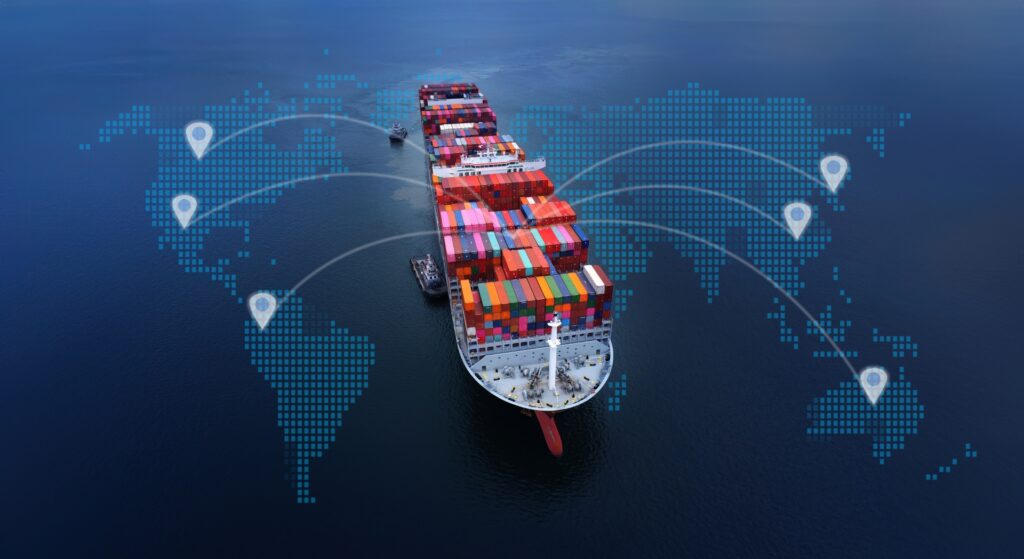Trade finance is the term used to describe the settlement arrangements available to buyers (importers) and sellers (exporters) that are used to mitigate risks and ensure the terms and conditions of an underlying commercial contract are met. I.e. the exporter gets paid and the importer receives the goods or services, both with minimal risk.
Usefully, the ICC published a definition of Trade Finance in 2024:
Trade finance is a financial service facilitating the real economy, enabling businesses to finance, monetise, risk mitigate and settle trade flows, thus supporting the movement of goods and/or the performance of services regardless of maturity, both internationally and domestically.
According to the World Trade Organization, 80 to 90 per cent of world trade relies on trade finance in some capacity.
Why does trade finance exist?
Although global trade forms an integral part of the global economy, there are numerous risks involved in conducting business across borders. The key to fulfilling a successful trade transaction is to understand and mitigate these associated risks. Not all risks may be applicable to an individual trade transaction but it is important to have an awareness of all the involved issues.
For example, you will likely encounter sales contracts with credit terms which allow the buyer of the goods to only pay the seller after the delivery of the goods.
These types of credit terms can result in a drain on the seller’s working capital to cover the period of research, manufacturing, shipment, and customs clearance. This is an illustration of where the banks can step in to help both parties.
How does trade finance work?
A typical trade finance transaction will include the buyer (importer), the seller (exporter) and the banks of the buyer and seller.
The buyer agrees to acquire ownership (of goods), or benefit or usage (of services) under a contract of sale. The seller agrees to make a sale to an actual or potential buyer for products or services, under a contract of sale. Banks can provide the funding and liquidity arrangements to help settle the contract of sale. Allowing accessible financing along the entire physical supply chain ensures exponential benefits to all entities involved in a trade transaction.
The ‘risk ladder’ is an important tool to help buyers and sellers determine the most appropriate form of settlement depending upon client relationship, location of the parties, goods or services that are involved, movement of funds and documents, and the options for settlement and financing.
It is important to note that as relationships evolve between both parties, more relaxed terms of settlement may be agreed. In order of preference for the seller (the opposite will apply for the buyer): Payment in Advance, Documentary Credit, Documentary Collection, Open Account.

Global Trade Certificate (GTC)
What are the different types of trade finance solutions?
Today, a broad set of trade finance solutions are available to corporations around the globe, they are all directed to satisfy needs of risk mitigation, settlement, information, and finance.
The “traditional” trade finance solution set can be split into two main categories:
- Settlement & risk mitigation-driven instruments: these provide payment assurance and/or trigger points for the payment itself. In short, these instruments satisfy the settlement and risk-mitigation needs of a company.
- Finance-driven instruments: These instruments primarily satisfy the financial needs of a company but also provide some risk-mitigation coverage.
In the graphic below we have given some examples of the different solutions for each category – please note this list is not all-encompassing.

Benefits of trade finance
Here are some of the key benefits to the main parties involved in a trade finance transaction.
Buyers (Importers) and Sellers (Exporters):
- Allows another party to assume the relevant risks.
- Secures more accessible risk mitigation and improved working capital flows.
- Ensures automated processes.
- Facilitates lower transaction cost enabling reduced transaction pricing.
Financial institutions:
- Enhances client relationships via provision of specific trade financing tools and solutions.
- Increases understanding of client businesses.
- Enables enhanced data integration and advanced financing solutions.
- Ensures reduced processing costs and facilitates shorter transaction completion times.
What does the future of trade finance look like?
Adapted from an article written by David Meynell: The future of trade finance
The future is inherently uncertain, but we can identify trends, and the potential direction based on current developments.
| Trend | Prediction | Rationale |
|---|---|---|
| Increased digitalisation | Trade finance processes will become more digitally-driven | The adoption of generative AI, digital ledger technology, smart contracts, and other technologies will streamline documentation, reduce fraud, and enhance efficiency. |
| Rise of alternative financing | Growth in alternative financing methods like supply chain finance and peer-to-peer lending. | Companies may seek more diverse funding sources as traditional banking relationships evolve, driven by fintech innovations. |
| Integration of AI and machine learning | AI and machine learning will play a larger role in risk assessment and decision-making. | Advanced analytics can provide more accurate risk profiles, improving lending decisions and reducing defaults. |
| Global trade policy changes | Trade policies will continue to evolve, influenced by geopolitical shifts and global events. | Changes in international relations, environmental concerns, and geopolitical events can impact trade agreements, tariffs, and regulations. |
| Focus on sustainability and ESG | Increased emphasis on Environmental, Social, and Governance (ESG) factors in trade finance. | Businesses and financial institutions may prioritise sustainable practices, influencing trade decisions and financing. |
| Greater collaboration and standardisation | More collaboration among banks, businesses, and governments to standardise and simplify trade processes. | Standardisation can reduce complexities, making it easier for entities to engage in cross-border transactions. |
| Continued regulatory changes | Ongoing adjustments to regulations governing trade finance. | Governments and regulatory bodies may respond to evolving economic conditions and geopolitical dynamics, impacting trade finance rules. |
| Expansion of trade credit insurance | Increased demand for trade credit insurance to mitigate risks. | Uncertainties in global markets may lead businesses to seek more protection against non-payment and political risks. |
| Adoption of Central Bank Digital Currencies (CBDCs) | Some countries may explore or implement CBDCs in international trade settlements. | CBDCs can streamline cross-border transactions and potentially reduce dependency on traditional currencies. |
| Resilience planning in supply chains | Enhanced focus on building resilient and adaptable supply chains. | Events like the COVID-19 pandemic have highlighted vulnerabilities, prompting businesses to prioritise resilience and contingency planning. |
These predictions are speculative and the actual trajectory of trade finance over the next decade will depend on a combination of factors – from economic conditions to regulatory changes.




